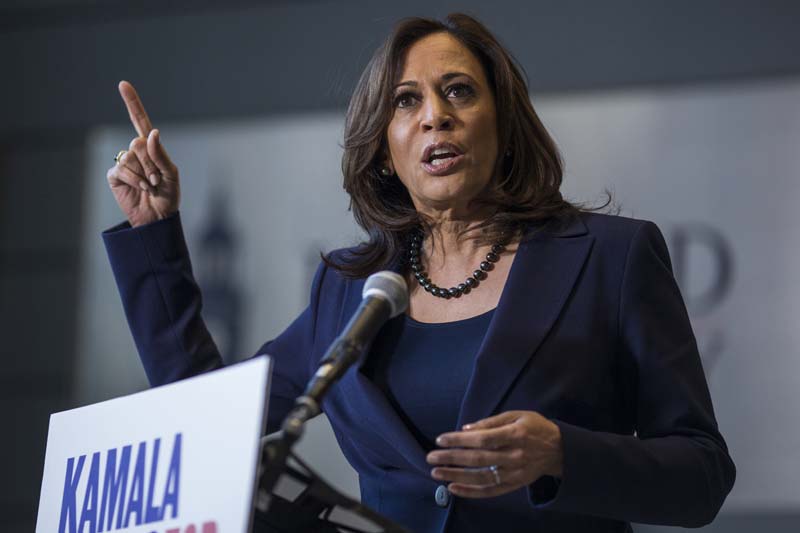 Zach Gibson for Bloomberg
Zach Gibson for Bloomberg
Voters who watched Biden stumbling under her relentless barrage saw her as a fighter who could take the battle to President Trump and win. The expectations for Harris were high going into the second round on Wednesday night — and yet the feisty former prosecutor quickly found herself on the ropes and never really managed to fight her way off them. Harris may throw a good sucker punch, but she also seems to have a glass jaw.
The night's first question went to Harris, who was asked to defend her newly released Medicare-for-all plan. The proposal is notably light on policy detail, such as what it will cover, how the substantial sums needed to pay for it would be raised, or how her administration would manage an inevitably disruptive transition. The only clear elements are an immediate opportunity for younger Americans to buy into Medicare, followed by a 10-year transition to something that would look a lot like the current Medicare system, including allowing private insurers to offer highly regulated alternative plans along the lines of Medicare Advantage.
In other words, the only thing we know about Harris's health-care policy is that she appears bent on appeasing progressives with a single-payer plan while reassuring moderates that she won't actually abolish private health insurance. Biden's campaign has fairly called this straddle a "have-it-every-which-way approach," and in the debate, Harris quickly got bogged down in a barbed exchange with him — revealing in the process that she has little command of health-care policy or even the messier details of her own plan.
Harris is now in the first rank of the contenders, and Biden wasn't the only candidate gunning for her. Almost everyone attacked her health-care plan in turn, and a besieged Harris turned borderline incoherent. When Sen. Michael F. Bennet (Colo.) pointed out that her plan would make employer-sponsored insurance illegal, Harris denied it — only to later admit to CNN's Anderson Cooper that, well, yes, it would. Later, she tried to deflect criticism of her plan's enormous cost with a non sequitur about expensive prescription drugs, as if it were impossible to control drug prices without nationalizing the entire U.S. health-care system.
And that was just the opening segment on health care; Harris still had hours to go. Her worst moment of the night came when Rep. Tulsi Gabbard (Hawaii) hit Harris with her own record as a prosecutor — including her refusal to release evidence that could have freed a man from death row, at least until a court finally forced her to do so. Harris failed to muster a convincing response, probably because this charge is entirely accurate.
The best Harris could manage was an esprit de l'escalier retort during the post-debate interviews, in which she accused Gabbard of being an apologist for Syrian dictator Bashar al-Assad. Then Harris botched even her belated delivery by choosing a rather unfortunate descriptor for Assad's Syrian victims, saying he "has murdered the people of his country like cockroaches."
Gabbard's attack, and Harris's inept response, goes to the heart of the senator's weakness, which is that she is still fundamentally a prosecutor. This can be an asset; Harris garnered an unusual amount of attention for a freshman senator through her surgical cross-examination of conservative witnesses in committee hearings. Most notably was during the confirmation hearings for Supreme Court Justice Brett M. Kavanaugh.
But while prosecutors are usually adept at asking questions, they don't necessarily get much practice answering them. That didn't matter so much when Harris was one of many hopefuls and could simply deliver her focus-grouped talking points. But now that she's one of the leading candidates, all of the other contenders are looking to shove her aside. She has to play defense as well as offense, and she's apparently not very good at it.
Those deficits could theoretically be repaired by intensive practice with her debate prep team. Unfortunately, that team can't sandpaper away the other legacy of her prosecutorial history: Harris's long record of putting low-income people in jail and keeping them there. She is now trying to recast herself as a crusading reformer who was really fixing the system. But any close examination of Harris the prosecutor reveals someone very much like Harris the presidential candidate: keen on getting the job, not particularly concerned with the details of how she gets there.
Every weekday JewishWorldReview.com publishes what many in the media and Washington consider "must-reading". Sign up for the daily JWR update. It's free. Just click here.
(COMMENT, BELOW)
Megan McArdle is a Washington Post columnist who writes on economics, business and public policy. She is the author of "The Up Side of Down." McArdle previously wrote for Newsweek-the Daily Beast, Bloomberg View,the Atlantic and the Economist.


 Contact The Editor
Contact The Editor
 Articles By This Author
Articles By This Author